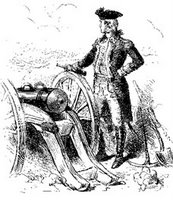Lt. Col. Abijah Brown in the Fight
As of 19 April, Brown was a major in Thomas Gardner’s Middlesex County militia regiment. But the militia wasn’t the same as the newly forming, enlisted-through-December Massachusetts army. Gardner already had his top officers: Lt. Col. William Bond and Maj. Michael Jackson. They were officially commissioned on 2 June.
Brown ended up as lieutenant colonel in Col. Benjamin Ruggles Woodbridge’s regiment, drawn otherwise from western Massachusetts and still getting organized. Woodbridge (1739-1819, shown here) was a wealthy bachelor physician from South Hadley. He needed companies to fill an entire regiment and justify his rank as colonel, and Brown needed a regiment where he could be lieutenant colonel.
It took until 21 June before the committee of safety thought Woodbridge’s eight companies were ready for a commission. As of 29 July Gen. George Washington still deemed that regiment to be among the four “most deficient” in the Continental Army.
Brown was officially listed as joining Woodbridge’s regiment on 17 June. That became an issue months later when he came to collect his pay. According to the Continental Army records, he had worked only six and a half months in 1775, but Massachusetts records show the committee of safety had set him to work a month earlier than that, and he probably showed up in Cambridge on 21 May.
Brown pressed his case to the Massachusetts General Court, which on 31 Aug 1776 resolved:
That there be paid out of the publick Treasury to Colonel Abijah Brown, nine pounds, for twenty seven days’ service as Lieutenant-Colonel in Colonel Woodbridge’s Regiment, it appearing he was made up in the muster-roll of said Regiment so much short of the time he was in cervice.This is an example of Brown’s persistence in seeking what he wanted.
Though not yet official, Woodbridge’s regiment fought in the Battle of Bunker Hill on 17 June. As it crossed the peninsula into Charlestown, the companies split up and rushed forward to different parts of the line. There are few sources about what Woodbridge’s men did on that day, but they were definitely in the fight.
At the end of September, Col. Woodbridge’s regiment was stationed “at west side of Prospect Hill on the road leading from Charlestown River to Monotomy.”
How well was Lt. Col. Brown getting along with his regimental commander? Gen. Washington’s general orders for 29 Sept 1775 include this item:
A Court of enquiry to sit this afternoon at three ’OClock to examine into the Complaint of Lt Col. Abijah Brown of the 25th Regt against Col. Ruggles Woodbridge—Col. [John] Glover president, Col. [Ebenezer] Bridge, Major [Daniel] Wood, Major [William Raymond] Lee and Major [John] Durgee [Durkee], members.Unfortunately, that record doesn’t say what Brown’s “Complaint” was. Since Col. Woodbridge remained in the army for the rest of the year, even sitting on other court-martial boards, the court appears to have ruled in his favor.
That proceeding was followed by another reported on 7 October:
Lieut. Col. Abijah Brown tried at a late General Court martial, whereof Col. [Daniel] Hitchcock was presdt—for “endeavouring to defraud the Continent, in mustering two Soldiers, whom he at the same time employed in working upon his farm”TOMORROW: The verdict, and the generals’ opinion of the verdict.




